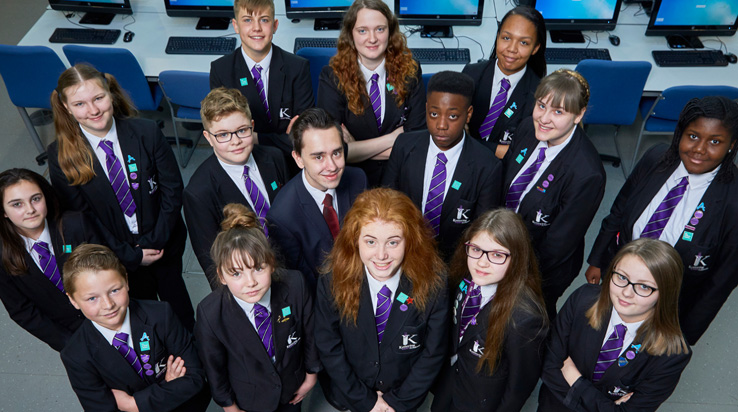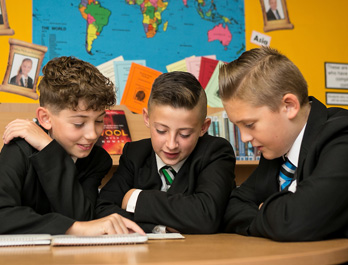
The background
For 25 years the Brooke Weston Trust has transformed educational performance across their local communities – providing the best quality teaching, fostering ambition and showing students that hard work can enable them to achieve their dreams. Based in the East Midlands, the Trust comprises a family of ten State Primary and Secondary Schools collectively educating more than 7,000 students each year. From pre-school to sixth form the Trust has a long history of helping young people move on to the next stage of their lives fully prepared and ready to succeed.
This is a Trust that is proud to innovate, to challenge and to out-perform. The Trust has been a pioneer in technology for a generation – employing its own web designer and developing an online business that generated a profit – in the mid-1990s. These were bold decisions at that time that marked it out as a leader on the national educational stage. However, to stay ahead, you need to keep innovating, and the current Leadership realised that their approach to technology was long overdue a review.
The challenge
This all came into sharp focus when the Trust took on the Thomas Clarkson Academy in Wisbech around ten years ago – a PFI school with an incumbent technology managed services contract that was not working well for any party. There were many issues, most of which stemmed from a lack of clear ownership between the provider, the school and the Local Authority who had put it in place.
Apart from this Academy, technology was managed in-house in each of the other schools in the Trust, which gave the Trust Leadership Team a unique opportunity – to tender the contract at this one Academy and use that as part of a controlled experiment to compare it with what they had in-house – on cost, on service, but also on culture and fit with the very strong values that underpin the Brooke Weston Trust.
“We had focused for a long time on maintaining all our school services in-house, yet we ran the risk of being left behind without something to stimulate the debate for a different approach. We could not afford for that to happen”.
Dr Andrew Campbell, Chief Executive

Following careful due diligence, in 2016 the Trust ran a tender for a technology managed services partner at Thomas Clarkson Academy, and chose RM as the successful bidder. Whilst the attraction of a small committed in-house team had worked well, there was a feeling that a more substantial partner – such as RM – could provide much greater resilience and sight lines into wider opportunities than that Academy (or the Trust) could ever envisage.
“The catalyst for change was the need to overhaul the strategy that had existed previously. We needed to be bolder across the Trust and this gave us the opportunity to try things locally in a low-risk controlled manner”.
Dr Andrew Campbell, Chief Executive
The response
In 2018, the Trust set about a complete strategic overhaul – encompassing people, culture and the infrastructure that made the Trust’s schools tick. This was a three-year project with a 2021 completion… and then – early in 2020 – the pandemic struck!
“The reality is that we were already working towards a Trust-wide remote learning offer – it is just that the pandemic just accelerated everything”.
Dr Andrew Campbell, Chief Executive

Prior to this, a key milestone – building on the Trust Leadership Team’s confidence in the progress that Thomas Clarkson Academy had been having with RM – came in 2019, when the decision was taken to appoint an external organisation to manage their technology roadmap. Initially this involved an internal “IT Governance Group” to make sensible decisions on technology, and in 2020 – following appropriate market due diligence – the Trust appointed RM as their technology partner for all ten schools – to design, deliver and implement an innovative managed IT service Trust-wide. Whilst this process commenced before the pandemic struck, it did not conclude until August 2020, whereupon the Leadership Team confirmed the new contract, citing an important factor in their final decision being RM’s scale and resilience as a partner who would help them mitigate the risks that could be foreseen at that early stage of the disruption.
“The selection process was difficult, but we were impressed by the approach that RM set out, their understanding of what we needed, and the solution that they proposed. They demonstrated a wide appreciation of what schools should expect from IT – now and in the future – with real innovation in the ways that they would support us. We were particularly impressed with their approach to the transition process, the proof points about working within a MAT structure, and the importance of robust risk management and business continuity processes”.
Tim Laws, Senior Operations Manager
With an experienced technology partner in place, the Trust were able to move at pace, setting the goal to have a modern digital tenancy in place built around Microsoft Teams, once all of their schools returned after the summer break in September 2020. At this stage this would not be for students – just to enable the cross-collaboration for the Trust as a whole.
As with all projects of this nature, it was not all plain sailing, with several previous decisions unpicked, and many moments of deep refection and sharp intakes of breath. But – as is often the case – with the right experience on hand, clear direction from the top, and a level of determination from all involved, the Trust were able to implement a digital capability in advance of the Department for Education making remote learning mandatory.
“We knew from the first Lockdown that we would need to do more this time. In March 2020 we had a variety of asynchronous teaching methods – some paper, some online, some third-party (such as Oak National Academy) – but by October the same year we had a fully functioning MS Teams remote teaching operation predicated on live lessons in our secondary schools – and we didn’t miss a beat!”.
Dr Andrew Campbell, Chief Executive
The last year has demonstrated that anything is possible. But you cannot run solely on adrenalin for any extended period of time – instead, you need robust processes and a support mechanism in place that can be relied upon. As a leader you also need to accept that people are looking to you for direction – showing tangible progress is an important part of retaining others’ confidence.
As a Trust, for Brooke Weston, all decisions, resources and problems were shared ones. This was especially true for content, with certain groups tasked with creating specific content that could be shared with other schools in the Trust – something that would be almost impossible in a single-setting. This was also one of the reasons they moved to a single technology provider – to share resources, but also to share training, top tips and best practice.
As the technology has rolled out, the more professional the project management that underpins it. Staff and pupils are trained in how to use it at the right time, with work and lessons rolled out in line with that. Each secondary school is now offering mixed and live pedagogies, contributing to the debate that rages nationally.
Each school has now embraced this new way of working – teachers log all attendees in remote lessons (and non-attendees), along with those who complete assignments (and how much are completed – a quarter, a half etc.). This is all then shared to inform intelligence gathered by each school’s Safeguarding team – overlaying this engagement data with what they know about that child in order to ascertain what – if any – further interventions are needed. This is not something that could have been attempted in the same granular detail the pre-Covid world.
“We put the ClassDojo app into the most disadvantaged primary school in Corby – an ex-steel town – and by the end of the first week 60% of parents were using it – we didn’t expect that – it shows the cultural shift that is taking place within society”.
Dr Andrew Campbell, Chief Executive
It is interesting that with so many aspects of our life being turned on its head, there is an expectation that schools – and teachers – know the answers to everything that is asked of them. The amazing thing is that teachers are trying to make sense of it all – trying to bridge those gaps that do exist to maintain the education of their pupils. For Brooke Weston Trust, they did not insist that staff came into work if they could do their job in a different way – it was that type of empowerment that makes this Trust what it is.
The lessons learnt
- If you get the chance, trial things first - for Brooke Weston Trust, they did not know whether an external technology partner would work better for them than their long-term in-house model, so when they got the chance to see both in practice, they leapt at it, and after a period of parallel running, selected the approach that delivered the best results.
- Develop a genuine sense of “we are all in it together” - no-one really knew all the answers or what the future held, but by giving everyone a voice made people feel part of a team and maximised the chance that they came out of this stronger than when they all went into it.
- Do not let yourself get too despondent - a lot of new ideas and innovation have come out of the last 11 months – the question now is how to build upon them – rather than quickly bury this last year as though it never happened.
- Build strong relationships - with governors, with parents, with other schools, with partners like RM – all of which bring something to the party and if the relationships are robust then you can all benefit from each other’s knowledge and experience.
- Whilst the technology is important, it isn’t the only lever - many Brooke Weston Trust schools, and their parents, are having “no screen days” – giving a child a pack to work through, and a lot of encouragement to do more hands-on tasks and challenges in and outside the home. The key is the blended nature of all of your teaching options – not an obsession in just one.
The Legacy
Most schools, trusts, teachers and leaders have seen the pandemic as a deeply frustrating and damaging event for everyone. That said, many are seeing it as the opportunity to make great strides forwards. At Brooke Weston Trust they have seen what has happened over the last eleven months as an opportunity to re-evaluate what they do as a Trust – giving people their voice – to share their thoughts on how to overcome a problem, and how to push aside any hurdle that comes their way.
There is a recognition that in a period when people do not know all the answers, they will use their experience and their skills to come up with sensible solutions. At times during the pandemic risk assessment were very hard to do, as people did not truly know how to assess them, but by being honest about trusting those who knew their sites best, who had had the training, and then could apply it in a practical and pragmatic way, ensured that sensible decisions were always reached.
“I think the pandemic has shown us that we can ‘trust people ambitiously’ – to give people the freedom to follow their instincts without any fear of comeback or censure. Knowing someone ‘has your back’ gives people the confidence to do their best”.
Dr Andrew Campbell, Chief Executive
Download a PDF of the case study